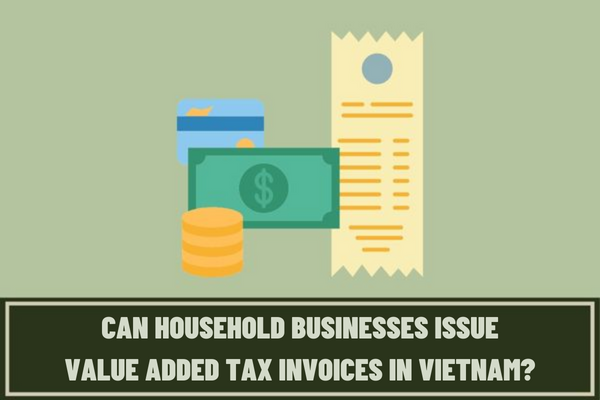Can household businesses issue value added tax invoices in Vietnam? If not, how to solve it?
Can household businesses issue value added tax invoices in Vietnam?
Pursuant to Clause 1, Article 8 of Decree 123/2020/ND-CP stipulating as follows:
Invoice types
Invoices prescribed herein are classified into the following types:
1. Value-added tax (VAT) invoice is an invoice which may be used by organizations making VAT declaration by employing the credit-invoice method for the following activities:
a) Domestic sale of goods or provision of services;
b) Provision of international transport services;
c) Export of goods to free trade zones and other cases considered as export of goods;
d) Export of goods or provision of services in a foreign market.
Thus, a value added tax invoice is an invoice which may be used by organizations making VAT declaration by employing the credit-invoice method for the activities as prescribed above.
On the other hand, according to the provisions of Clause 2, Article 10 of the 2008 Law on Value Added Tax in Vietnam (amended and supplemented by Clause 4, Article 1 of the 2013 Law on Amendments to the Law on Value Added Tax in Vietnam), as follows:
Tax deduction method
...
2. The deduction method is applicable to the business establishments that comply with the regime for accounting and invoicing according to the laws on accounting and invoicing, including:
a) Business establishments that earn annual revenue of at least 1 billion VND from goods sale, except for household businesses and individuals;
b) Business establishments that voluntarily employ the deduction method, except for household businesses and individuals.
According to the above regulations, it can be understood that household businesses are not subject to value added tax deduction method and are not subject to value added invoices.
Thus, if a household business wants to issue a value added invoice, it must convert its form to an enterprise.

Can household businesses issue value added tax invoices in Vietnam? If not, how to solve it?
Can household businesses use tax authority-ordered printed invoices?
Pursuant to Article 23 of Decree 123/2020/ND-CP stipulating as follows:
Use of tax authority-ordered printed invoices
Departments of Taxation in provinces and centrally-affiliated cities (hereinafter referred to as “provincial Departments of Taxation”) may order the printing of invoices resold to the following entities:
1. Enterprises, business entities, and household or individual businesses mentioned in Clause 1 Article 14 hereof if they do not have electronic transactions with tax authorities, IT infrastructure, accounting software systems or e-invoicing software functioning as the tools of using e-invoices and transmitting e-invoice data to buyers and tax authorities.
Enterprises, business entities, and household or individual businesses may buy invoices from tax authorities for a period of up to 12 months while tax authorities must have solutions for gradually converting to the use of e-invoices. Before using e-invoices, business entities, and household or individual businesses must apply for use of authenticated or unauthenticated e-invoices (if eligible) in accordance with the provisions in Article 15 hereof.
2. Enterprises, business entities, and household or individual businesses during the period of failure of the tax authority’s authentication code issuing system as prescribed in Clause 2 Article 20 hereof.
According to the above regulations, household businesses are one of the cases where they can order tax authority-ordered printed invoices.
Thus, household businesses are not eligible to issue value added invoices but can purchase invoices from tax authorities to calculate value added tax.
What are the procedures for purchasing tax authority-ordered printed invoices?
Pursuant to the provisions of Clause 1, Article 24 of Decree 123/2020/ND-CP as follows:
Selling tax authority-ordered printed invoices
1. An enterprise, business entity, or household or individual business that is eligible to buy invoices from the tax authority (hereinafter referred to as “buyer”) shall submit an application for invoice purchase (using Form No. 02/DN-HDG in Appendix IA enclosed herewith), accompanied by the following documents, to the tax authority:
a) The buyer (the applicant or person authorized in writing by the enterprise, business entity, or household or individual business as prescribed by law) shall present his/her unexpired ID card or citizen’s identity card;
b) The buyer that buys invoices for the first time shall provide a commitment (using Form No. 02/CK-HDG in Appendix IA enclosed herewith) on its business location which must be same as that specified in the certificate of enterprise registration, certificate of branch registration, certificate of household business registration, taxpayer registration certificate, TIN notification, investment registration certificate, certificate of cooperative registration or establishment decision issued by a competent authority;
c) The buyer shall take responsibility to write or stamp name, address and TIN on copy 2 of every purchased invoice before taking them from the tax authority’s premises.
Thus, a household business wishing to purchase tax authority-ordered printed invoices must submit an application for invoice purchase accompanied by the following documents, to the tax authority:
- The buyer (the applicant or person authorized in writing by the enterprise, business entity, or household or individual business as prescribed by law) shall present his/her unexpired ID card or citizen’s identity card;
- The buyer that buys invoices for the first time shall provide a commitment on its business location which must be same as that specified in the certificate of enterprise registration, certificate of branch registration, certificate of household business registration, taxpayer registration certificate, TIN notification, investment registration certificate, certificate of cooperative registration or establishment decision issued by a competent authority.
LawNet
